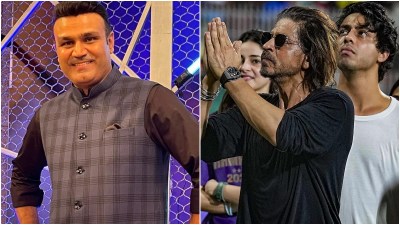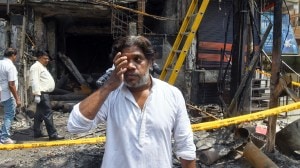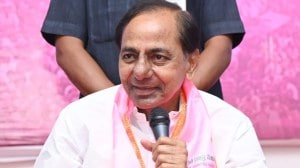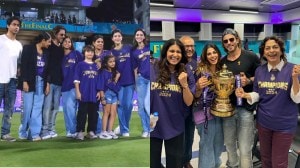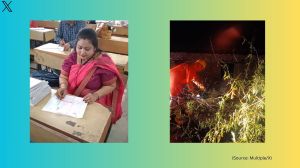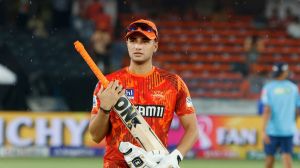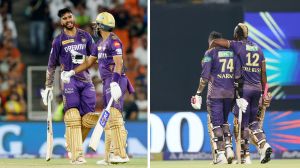- India
- International
‘Priyanka Chopra has a sense of purpose, is driven to tell authentic stories’: WOMB’s Srishti Bakshi
Srishti Bakshi, the star of the documentary Women of My Billion or WOMB, reflected on her journey as she walked 3,800-kilometer across the country to meet women who have faced violence. She also shared insights into how Priyanka Chopra got involved with the project.
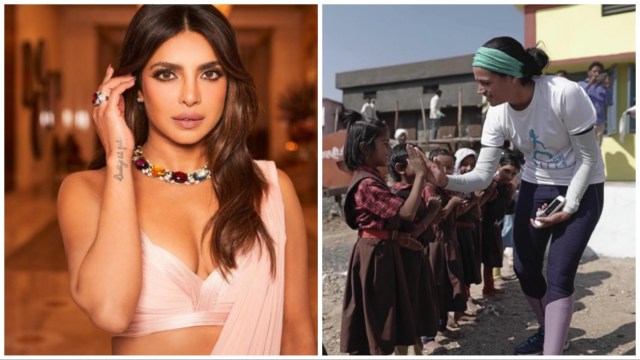 Priyanka Chopra has produced Amazon Prime Video's documentary WOMB, which is based on Srishti Bakshi journey across India. (Pic: Priyanka/Instagram)
Priyanka Chopra has produced Amazon Prime Video's documentary WOMB, which is based on Srishti Bakshi journey across India. (Pic: Priyanka/Instagram)It took one single article recounting the harrowing rape of a mother and daughter to compel Srishti Bakshi to return to India and embark on a journey from Kanyakumari to Srinagar on foot to raise awareness about violence against women in the country. While Srishti marched alone on the road, little did she know her efforts would soon be echoed by Priyanka Chopra, who joined her in sharing her experiences, along with other compelling stories, in the Amazon Prime Video documentary, WOMB (Women Of My Billion).
Along with co-producing the documentary, Srishti disclosed to indianexpress.com that Priyanka brought a breath of fresh air with her support as a global star, solely motivated by her drive to tell authentic stories. Reflecting on her journey, Srishti opened up about the mental and physical challenges she faced and discussed the reasons behind her unwavering determination to persevere despite them.
Excerpts from the interview:
Why did you choose to walk across India to take this initiative forward?
At the time I was in Hong Kong pursuing a career in branding and marketing. I would talk with a lot of people abroad and they would want to visit India but they always had the question of safety in their mind. I would debate with them and talk to them about our country. I have a deep love for India. I remember reading about the Highway 91 case where a mother and a daughter were raped in front of the father. It moved me to a degree that I could not function. I was devastated and I decided I wanted to do something about it. I was an armchair activist until then but that’s the day I decided I wanted to do go on the ground and have the pulse of the nation. Alongside UN as the partner and many other people, I decided to walk and meet women.
Why did you choose to tell the story of only three women among all the stories that you witnessed?

It was a process, we had thousands of hours of footage and interviews with 300 women. The design of the documentary was done by the production house and director Ajitesh Sharma. We felt that what these three women did would represent those 300 women. So you can see variation in their experience and they come from different backgrounds. For instance, Neha comes from a privileged background. A lot of people think that violence happens only in poor households but that is not the case. These stories show how these women emerged from that situation and came on the other side.
Was it important to show hope in the end?
The reason why there is hope in the film is because there is real hope in the country. When I walked across India, I felt the violence was inflicted by a minority. Maximum number of people want change. The film is a reflection of what my thought process was by the end of the journey. There are people who want change and my mindset was to amplify their voices. I have met fathers who send their daughters to schools and colleges against the wishes of the whole community. That’s what is reflected in the film.
View this post on Instagram
Apart from the physical pain of walking, the documentary shows you going through a mental struggle after meeting victims of sexual and domestic violence. In between all this you also headed workshops for women. How did you pull it off?
At some point, I just started reflected the energy of the women around me. The question of ‘Why am I doing this?’ ‘Will this make any impact?’ kept coming back to me. But once I was walking with the group of Asha workers and one woman was black and blue. She was clearly beaten the previous evening. I didn’t have the courage to ask her ‘what happened.’ But she walked with us and after the walk, she came and told me, ‘You would have guessed what has happened to me but after hearing your story, I am not going to let anybody do this to me anymore.’ That one line felt like a ray of hope. Eventually, it became about the energy of these women.
How did Priyanka Chopra get involved with the project and how was your experience working with her?
Priyanka brought a breath of fresh air in terms of the support she provided. There are very people in that stature who are able to share the spotlight. She watched the film and really liked it and from day one it was about how can we get it across to many more people. So, she has a relationship with platforms and different people. In my life, I have discovered that people who join such journeys are intrinsically motivated to be part of it and that motivation and sense of purpose was in Priyanka. I have always been a fan of her work but it converted into a relationship because she felt compelled to join. She is an army officer’s daughter, as am I.
Since there are a lot of similarities between you and Priyanka, was it important that she participates in your story?
Yeah, and she has participated in this story with the time she dedicated to it and the kind of vigour she brings with her. She and her team made sure that it was presented in an authentic way. She invests her time in authentic stories and that’s a merit. A lot of people join in for fame and name but she joined in for what it brings to the world, the conversation that it drives, and the kind of influence it will have on young girls across the country. She had that right support bond.
What’s the most painful story you came across during your journey?
In one of my workshop, I came across this boy who said that girls should not wear short dresses. No fault of his, he is a young, impressionable person and that’s the impression he has. He is taught that girls should behave in a certain way and that was sad. It was a situation when I realised that it is so deeply ingrained that it is on a child’s mind. We have to be able to train thinking, which is the hardest job to do. Changing the culture of how you observe women.
The other most painful incident was the Dewal village rape case. It wasn’t the only case there were many such cases where girls and women are no more to tell their stories. Those moments were the most difficult as you feel a little lost and you question your existence, your country, and your own thought process but it also brings in a lot of motivation that you don’t want this to happen again and you don’t want this thinking to prevail so you want to change it.
Click for more updates and latest Bollywood news along with Entertainment updates. Also get latest news and top headlines from India and around the world at The Indian Express.
Photos
May 28: Latest News
- 01
- 02
- 03
- 04
- 05


